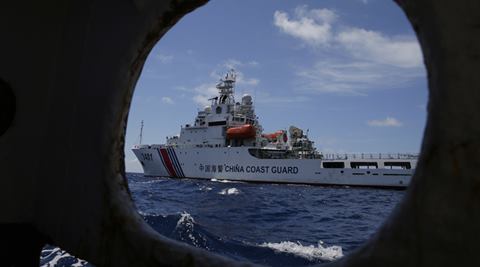The Philippine defense chief said Friday that he told the US military that plans for joint patrols and naval exercises in the disputed South China Sea have been put on hold, the first concrete break in defense cooperation after months of increasingly strident comments by the country's new president. Defense Secretary Delfin Lorenzana also said that 107 US troops involved in operating surveillance drones against Muslim militants would be asked to leave the southern part of the country once the Philippines acquires those intelligence-gathering capabilities in the near future.
President Rodrigo Duterte also wants to halt the 28 military exercises that are carried out with US forces each year, Lorenzana said. Duterte has said he wants an ongoing US-Philippine amphibious beach landing exercise to be the last in his six-year presidency as he backs away from what he views as too much dependence on the US. With the turquoise backdrop of the South China Sea, US Marines and allied Filipino combat forces waded ashore in a mock assault Friday on a Philippine beach in San Antonio town in northwestern Zambales province. Gunfire rang out as the world superpower and its former colony showcased the lethal power of their alliance.
Pounding rain prevented military aircraft from joining the beach assault drills, but the US and Filipino forces managed to rapidly come on shore to take out a "notional target,'' said Maj. Roger Hollenbeck, a US military spokesman for the drills. Asked to comment on the possibility that the joint maneuvers will be the last under Duterte, Hollenbeck replied, "If it's the last, so be it.''
"I have nothing to do with that and we are going to continue to work together, we've got a great relationship,'' he said. Duterte, who took office in June, has had an uneasy relationship with the US, his country's longtime treaty ally, saying in recent speeches that he wants to scale back the presence of visiting US troops in the country.
But while some Filipino officials have walked back on Duterte's sometimes crude anti-US pronouncements, early this week he told President Barack Obama "to go to hell'', Lorenzana's comments show for the first time that the Duterte administration will act by rolling back cooperation with the US military in the Philippines. Despite the difficult stage in the countries' relations, Lorenzana remained optimistic that those ties would eventually bounce back.
"I think it's just going through these bumps on the road,'' Lorenzana told a news conference. "Relationships sometimes go to this stage ... but over time it will be patched up.''
Duterte's falling out with Washington will not necessarily spread to US allies such as Japan, for example, which has committed to delivering patrol ships for the Philippine coast guard and has signed a deal to lease five small surveillance planes the country can use to bolster its territorial defense. The planes may arrive as early as next month, Lorenzana said.
The US and Japan have helped the Philippines develop its capabilities to safeguard and defend its territorial waters amid China's increasingly aggressive actions in the South China Sea. Under Duterte's predecessor, Benigno Aquino III, the US and Philippine militaries twice staged naval exercises near the disputed waters.
The split in military relations comes as Duterte, who describes himself as a leftist politician, has lashed out against US government criticism of his deadly crackdown against illegal drugs, which has left more than 3,600 suspects dead in just three months, alarming Western governments and human rights groups. While taking a critical stance on US security policies, Duterte has reached out to China and Russia. Lorenzana said he has been ordered by Duterte to travel to Beijing and Moscow to discuss what defense equipment the Philippines can acquire from them.

